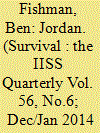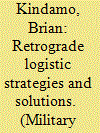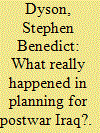| Srl | Item |
| 1 |
ID:
138608


|
|
|
|
|
| Summary/Abstract |
Since the outbreak of civil war in Syria, Jordan has been contending with a flood of Syrian refugees, straining an already beleaguered economy. Moreover, the rapid spread of the Islamic State of Iraq and al-Sham (ISIS) across Iraq has substantially increased Jordan’s vulnerability to extremist infiltration and terrorist attacks. All this while, King Abdullah has continued to champion a reform programme – at least in name – to address Jordan’s most salient political and economic vulnerabilities following the Arab uprisings of 2011. So the last thing that Jordan needed this summer was a war between Hamas and Israel in Gaza.
|
|
|
|
|
|
|
|
|
|
|
|
|
|
|
|
| 2 |
ID:
130112


|
|
|
|
|
| Publication |
2014.
|
| Summary/Abstract |
A retrograde operation is a manoeuvre to the rear or away from the enemy. It is part of a larger scheme of manoeuvre to regain the initiative and defeat the enemy. Its purpose is to improve the current situation or prevent a worse situation from occurring. Its objectives are to gain time, to preserve forces, to avoid combat under undesirable conditions, or to manoeuvre the enemy into an unfavourable position. Retrograde operations may facilitate repositioning forces, shortening or permitting unit withdrawals for employment elsewhere.
|
|
|
|
|
|
|
|
|
|
|
|
|
|
|
|
| 3 |
ID:
088139


|
|
|
|
|
| Publication |
2009.
|
| Summary/Abstract |
IN THE MIDDLE EAST Russia concentrates, to a great extent, its political-diplomatic efforts at creating a sustainable and reliable security system in the zone (or sub-region) of the Persian Gulf occupied by eight states: Bahrain, Iraq, Iran, Qatar, Kuwait, United Arab Emirates (UAR), Oman and Saudi Arabia. Its mineral wealth - about two-thirds of the world's explored reserves of oil and about one-third of the world's gas reserves - has made it critically important for global economic and energy security.
The current situation that has taken several decades to reach the present stage is best described as permanent instability worsened by repeated crises. The best illustration of many faults of the unipolar world, it was shaped by a series of bloody armed conflicts: the Iran-Iraq war of 1980-1988; the Kuwait crisis and the Desert Storm of 1990-1991 and the 2003 war in Iraq.
Since the early 1980s, the United States has been positioning itself as the main source of stability in the Gulf zone, a sphere of its vital interests.
|
|
|
|
|
|
|
|
|
|
|
|
|
|
|
|
| 4 |
ID:
123103


|
|
|
|
|
| Publication |
2013.
|
| Summary/Abstract |
STEPHEN BENEDICT DYSON challenges the argument that the U.S. government failed to conduct planning for the post-Saddam Iraq. He shows that a plan for governing the country jointly with Iraqi leaders was developed and endorsed by the George W. Bush administration. Yet this plan was not implemented as a result of the on-the-ground decisions of Ambassador L. Paul Bremer, who formalized an occupation and began an extended period of direct rule.
|
|
|
|
|
|
|
|
|
|
|
|
|
|
|
|